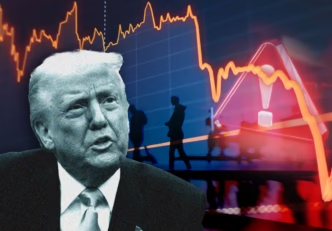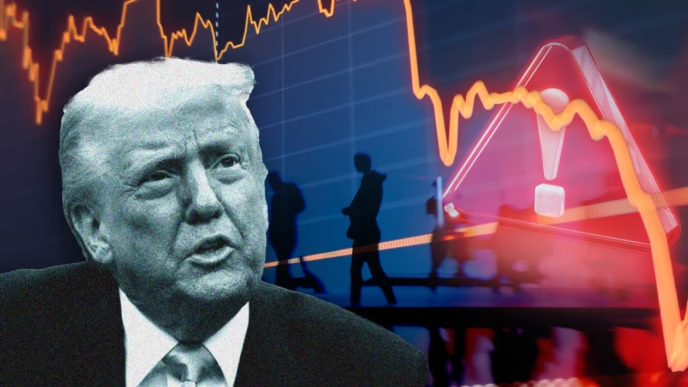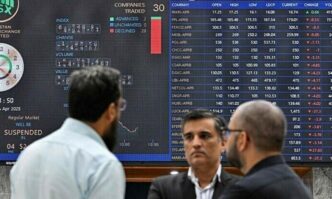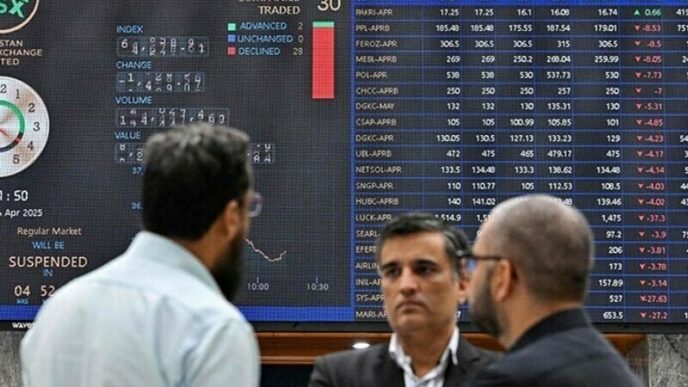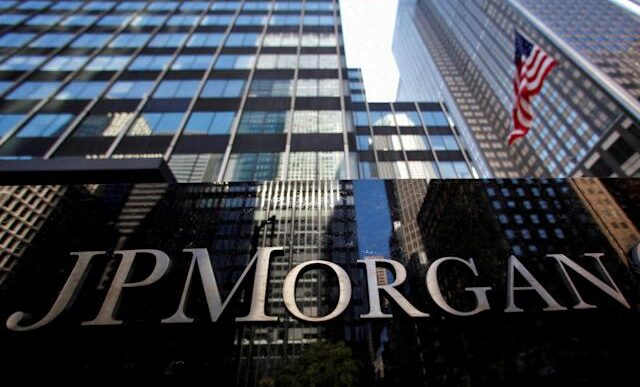Global stock markets experienced a downturn on Friday, driven by heightened concerns over persistent inflation and the looming threat of a trade war, sparked by U.S. President Donald Trump’s controversial tariff decisions.
While U.S. traders were already grappling with sticky inflation data, it was Trump’s announcement of a 25% tariff on auto imports and plans for even broader tariffs next week that continued to overshadow market sentiment. The news raised anxieties about a potential escalation in global trade tensions.
On Wall Street, all three major indexes closed lower for the third consecutive session. The S&P 500 dropped by 1.97% to 5,580.94, while the Dow Jones Industrial Average fell 1.69% to 41,583.90. The Nasdaq Composite saw a steeper decline of 2.7%, ending at 17,322.99. Sectors hit hardest included communication services, consumer discretionary, technology, and financial stocks, although utilities finished on a positive note.
In Europe, the STOXX 600 index also ended the day down by 0.77%, reflecting a broader decline over the week. The auto and auto parts sector weighed heavily on the index, with a near 1% drop. MSCI’s global stock gauge slid 1.58%, tracking for a weekly loss of 1.44%.
Michael Metcalfe, Head of Global Macro Strategy at State Street, noted that the U.S. car tariffs were more aggressive than anticipated, especially with no exemptions made for U.S. neighbors Mexico and Canada. He cautioned that the impact of these tariffs on broader trade policies next week could further dampen risk appetite in the market.
Gold Reaches Record Highs Amid Geopolitical Instability
In contrast to falling equities, gold prices surged to a fresh record high of $3,086.70 an ounce. The precious metal’s rally was driven by the escalating trade war fears, rising inflation, and the general geopolitical uncertainty gripping markets. Gold was last up 0.86% at $3,082.25 per ounce, with its quarter-on-quarter performance marking a significant 17% rise—its best quarterly performance since 1986.
Goldman Sachs’ forecasts point to further upside for the metal, with U.S. gold futures settling 0.8% higher at $3,114.30. Wasif Latif, Chief Investment Officer at Sarmaya Partners, attributed the rally to persistent inflation pressures, rising fiscal risks, and ongoing geopolitical tensions. “Inflation continues to be stubborn, and the fiscal risks tied to the U.S. budget deficit and Western sovereign debt are adding to market concerns,” Latif explained.
Bond Yields Fall as Market Prices in Potential Rate Cuts
The bond market mirrored the risk-off sentiment, with U.S. Treasury yields declining as investors adjusted their growth expectations in light of Trump’s tariff policies. U.S. 10-year Treasury yields fell 12 basis points to 4.249%, reflecting worries over the potential negative impact of the tariffs on economic growth. In the futures market, traders began pricing in the possibility of 66 basis points of interest rate cuts by the Federal Reserve this year.
Similarly, traders are now betting on a stronger likelihood of an ECB rate cut in April, with the probability of a 25-basis-point cut rising to 80%, up from around 50% a week ago. German Bund yields also dipped by 0.2 basis points to 2.731%.
Dollar Weakens Amid Inflation and Trade War Fears
The U.S. dollar continued its downward trend, weakening against major currencies, including the Japanese yen and euro, after inflation data came in hotter than expected. The dollar fell 0.87% to 149.73 against the Japanese yen, while the euro gained 0.29% to $1.0832. The Swiss franc also saw a slight strengthening against the greenback, which weakened by 0.06% to 0.881. Meanwhile, the Canadian dollar weakened slightly by 0.07% to C$1.43 per dollar.
Oil Prices Hold Steady as Tariffs Cloud Global Growth Outlook
Oil prices finished flat, with traders weighing the impact of U.S. tariffs and their potential effect on global economic growth. Brent crude futures fell 0.5%, settling at $73.63 a barrel, while U.S. West Texas Intermediate crude futures dropped 0.8% to close at $69.36 a barrel. The market remains on edge, assessing how the broader economic implications of the trade war will influence oil demand and global supply chains.
As market volatility intensifies, investors are bracing for further developments next week, particularly regarding new tariffs and their potential ripple effects on global markets.

